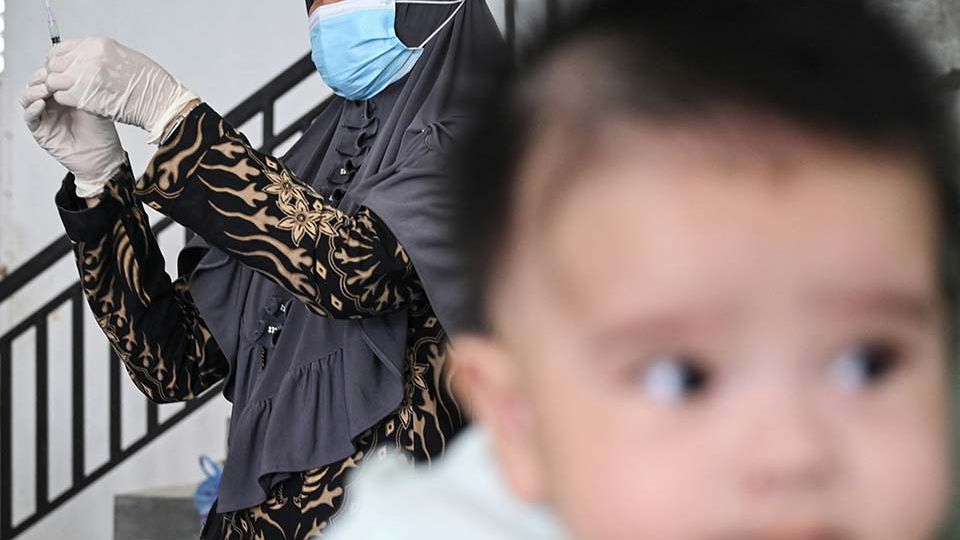May 20, 2025
JAKARTA – An ongoing clinical trial for a tuberculosis (TB) vaccine candidate in Indonesia has been met with rising public criticism, especially on social media, which experts attribute to unclear communication from health authorities surrounding the program.
Indonesia was selected as one of the countries to host the third phase of clinical trials for TB vaccine candidate M72/AS01E to assess the efficacy of the substance developed by London-based pharmaceutical company GlaxoSmithKline (GSK). The vaccine’s development is supported by the Bill & Melinda Gates Foundation, which was cofounded by American philanthropist and Microsoft cofounder Bill Gates and his wife at the time.
Along with African countries such as South Africa, Kenya, Zambia and Malawi, around 20,000 participants were selected for this round of the clinical trial, which kicked off in September 2024.
In Indonesia, 2,095 people aged 15 to 44 were picked to receive M72 from last September to April. The testing is being conducted by researchers in five clinical centers approved by the Food and Drug Monitoring Agency (BPOM), namely the University of Indonesia Hospital and School of Medicine, Persahabatan Central General Hospital, Cempaka Putih Islamic Hospital and Padjadjaran University’s Medicine School in Bandung, West Java.
The news about the vaccine candidate resurfaced recently when Gates visited Jakarta on May 7 and discussed several collaboration projects with President Prabowo Subianto, including the Gates Foundation’s funding of the TB vaccine clinical trial in Indonesia.
After the Prabowo-Gates meeting, Indonesian netizens quickly took to social media to express their concerns and rejections of the trial. Some accused the country of being used as a “lab rat” for the philanthropist’s agenda to “control the world”.
Health Minister Budi Gunadi Sadikin repeatedly reassured the public about the safety of the vaccine trial.
“Based on evidence, vaccines are effective in controlling infectious diseases. In Indonesia, TB kills 100,000 people each year, which is why the vaccine must be developed as soon as possible,” Budi said last week.
Pulmonologist Erlina Burhan of Persahabatan Hospital, who was appointed national lead researcher for the M72 clinical trial, also dismissed the concerns, saying that the trial is closely monitored by a team of researchers.
She also attributed public resistance o the clinical trial to “a lack of literacy about the benefits of the vaccine”.
“The vaccine works by boosting the body’s immune response to the TB bacteria,” Erlina told The Jakarta Post on Saturday.
“The available TB vaccine, BCG, is effective for children, with around 90 percent of children inoculated, but many get sick after they reach adolescence. […] That’s why we need a new vaccine for teenagers and adults,” she continued.
Bad communication
Erlina also cited the result from the previous phase of the clinical trial, which found that a two-dose administration of the M72 vaccine candidate was successful in reducing the development of active TB disease with 50 percent efficacy in adults infected by Mycobacterium tuberculosis, the bacteria that causes the disease.
The efficacy percentage may change as the trial continues, and it is expected to take place until 2028.
Read also: Govt defends tuberculosis vaccine trial in Indonesia
Public health expert Ilham Akhsanu Ridlo from Airlangga University noted that growing resistance to the clinical trial for the TB vaccine candidate stemmed from the poor and one-way communication about the process from the government.
“Minimal transparency, lack of communication on the risk and historical context as well as dependence on foreign donors have fueled criticism, skepticism and rejection, which reflects a crisis of trust and disappointment [in health authorities],” he said on Saturday.
Ilham also slammed the absence of scientific framing in public messaging around the critical trial, which led to people “perceiving the term ‘trial’ as if they are being sacrificed like lab rats”.
He urged the government to engage in dialogue with the public through public forums on the clinical trial, opening access to information about the research and deploying health communicators who can convey accurate messages.
Epidemiologist Dicky Budiman of Griffith University concurred, warning the backlash may have serious consequences for the government’s strategy to eradicate TB because “the public remains reluctant”.
Masdalina Pane of the Indonesian Epidemiologists Association (PAEI) told the Post on Saturday that the recent brouhaha arose from misleading claims that the trial was launched in Indonesia because of the country’s high TB mortality rate.
Read also: Govt looks to grassroots communities to bolster fight against TB
Reducing the death rate, she added, could only be achieved if the government strengthens other aspects of TB treatment in addition to vaccination.
“We need rapid early detection to identify TB status, ensure disciplined treatment to prevent drug dropouts and provide access to medication,” Masdalina said, adding that Indonesia should have picked other vaccine candidates with higher potential efficacy.
Health Ministry spokesperson Aji Muhawarman claimed that authorities had spread information and educated the public prior to the trial.
He also reasserted that Indonesia would gain significant benefits by participating in the clinical trial, such as transfer of knowledge and technology between international and local researchers, who can also assess whether the vaccine is compatible with our genetic codes or not.
“We also have the opportunity to access the vaccine earlier if it proves successful,” Aji said, adding that TB vaccination for adolescents and adults will be provided free of charge as part of the national immunization program.


